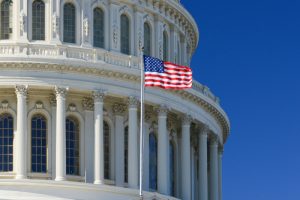
U.S. Reps. Tom Cole (R-OK), Ron Estes (R-KS), and Frank Lucas (R-OK) cited the benefits and some continuing concerns after the July 25 passage by the U.S. House of Representatives of the Bipartisan Budget Act of 2019.
“While no one will claim this legislation is perfect, we should all be proud of the compromise achieved as a result of good faith negotiations between the president and congressional leaders across party lines,” Rep. Cole said. “And I am encouraged that several bipartisan wins were achieved for the American people.”
If enacted, H.R. 3877 would set budgetary levels for fiscal years 2020 and 2021, suspend the debt ceiling until July 31, 2021 and prevent sequestration cuts from taking effect in October, among other provisions.
“While the bill isn’t perfect, President Trump and congressional leaders, from both sides of the aisle, are acting to protect the full faith and credit of the United States, provide clarity moving forward with the appropriations process, and are committed to the rebuilding and modernization of our military,” said Rep. Lucas.
“While I’m still concerned about increasing our national debt, I’m more concerned with the crippling economic effects that would be felt by all Americans should the U.S. default on the national debt and witness automatic sequestration cuts,” the congressman added.
Rep. Estes and Rep. Cole agreed.
For instance, Rep. Estes said H.R. 3877 would add $2 trillion to the federal debt over the next decade and increase the nation’s debt to 97 percent of GDP by 2029.
“By raising budget caps $322 billion and suspending the debt ceiling until 2021, this deal gives Washington free reign to increase government spending at will for the next two years while kicking the can down the road,” said Rep. Estes. “Despite the Trump administration proposing $574 billion in cost offsets, the final deal includes just $77 billion in offsets; not enough to justify this massive increase in spending.”
Meanwhile, Rep. Cole said a default on the national debt would create “horrific consequences” that “would lead to extreme economic chaos.”
But he also pointed out that H.R. 3877 “avoids the automatic and devastating sequestration cuts set to take place in October” and would enable Congress “to proceed with confidence and clarity in the appropriations process for the coming fiscal year.”
“To be clear, both sides had to give up some things to reach this point,” said Rep. Cole, “but that is what makes a compromise, and that is what enables us to get things done, especially in this era of divided government.”
Rep. Estes said he’s happy the bill includes important investments in the U.S. military, but he called the overall spending levels both “dangerous and irresponsible.”
“While I voted against today’s budget, I am committed to working with President Trump to cut government spending and grow our economy to protect future generations of Kansans and Americans,” he said.



